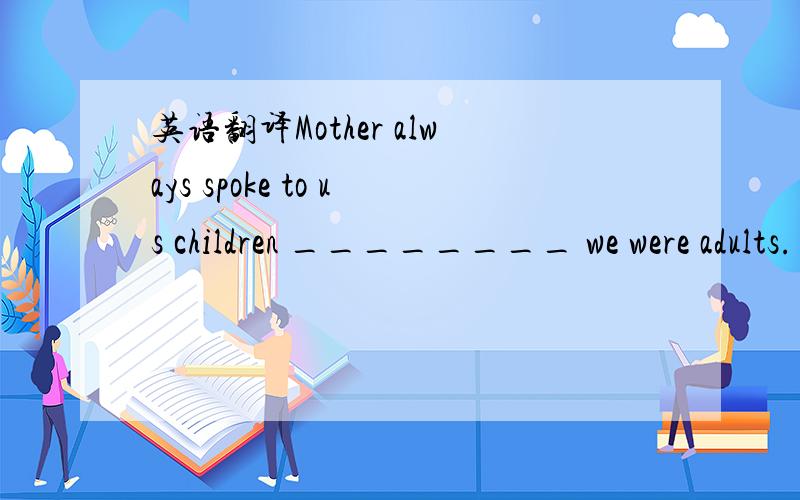иӢұиҜӯзҝ»иҜ‘Mother always spoke to us children ________ we were adults.
жқҘжәҗпјҡеӯҰз”ҹдҪңдёҡеё®еҠ©зҪ‘ зј–иҫ‘пјҡдҪңдёҡеё® ж—¶й—ҙпјҡ2024/05/01 16:24:19

иӢұиҜӯзҝ»иҜ‘Mother always spoke to us children ________ we were adults.
иӢұиҜӯзҝ»иҜ‘
Mother always spoke to us children ________ we were adults.
иӢұиҜӯзҝ»иҜ‘Mother always spoke to us children ________ we were adults.
еӣ дёәusе’ҢchildrenеңЁиҝҷйҮҢжҳҜеҗҢдҪҚиҜӯusе°ұжҳҜchildren.
еҰҲеҰҲжҖ»жҠҠжҲ‘们еҪ“жҲҗеӨ§дәәдјјзҡ„е’ҢжҲ‘们иҝҷдәӣеӯ©еӯҗи®ІиҜқ.
as if жҳҜиҷҡжӢҹиҜӯж°”жүҖд»ҘеҗҺйқўзҡ„BEеҠЁиҜҚз”Ёзҡ„д№ҹжҳҜWEREиҖҢдёҚжҳҜare.
AS IF
conj.
1. In the same way that it would be if: looked as if she were made of ice.
2. That: It seemed as if the meeting would never end.
Source: The American Heritage® D...
е…ЁйғЁеұ•ејҖ
AS IF
conj.
1. In the same way that it would be if: looked as if she were made of ice.
2. That: It seemed as if the meeting would never end.
Source: The American Heritage® Dictionary of the English Language, Fourth Edition
Copyright © 2000 by Houghton Mifflin Company.
Published by Houghton Mifflin Company. All rights reserved.
AS IF
Also, as though. As it would be, as in He decided to accept, as if it really mattered, or John scowled as though he were really angry. The first idiom dates from the late 1500s, the variant from the late 1700s. Also see make as if.
source: http://www.dictionary.com
~
Mother always spoke to us children AS IF we were adults.
Mother always spoke to us children LIKE we were adults.
Mother always spoke to us children AS THOUGH we were adults.
~
The meaning is that Mother spoke to us not like she was speaking to children, but she spoke to us in the same was as an adult.
You cannot use "although" here, it is completely the wrong meaning.
To use although you would have to use it like this, to have the same meaning:
Although we were children Mother always spoke to us like adults.
~
ALTHOUGH
conj.
Regardless of the fact that; even though.
Usage Note: As conjunctions, although and though are generally interchangeable: Although (or though) she smiled, she was angry. Although is usually placed at the beginning of its clause (as in the preceding example), whereas though may occur elsewhere and is the more common term when used to link words or phrases, as in wiser though poorer. In certain constructions, only though is acceptable: Fond though (not although) I am of sports, I'd rather not sit through another basketball game.
Source: The American Heritage® Dictionary of the English Language, Fourth Edition
Copyright © 2000 by Houghton Mifflin Company.
Published by Houghton Mifflin Company. All rights reserved.
ALTHOUGH
adv : despite the fact that; "even though she knew the answer, she did not respond" [syn: though, tho']
收иө·